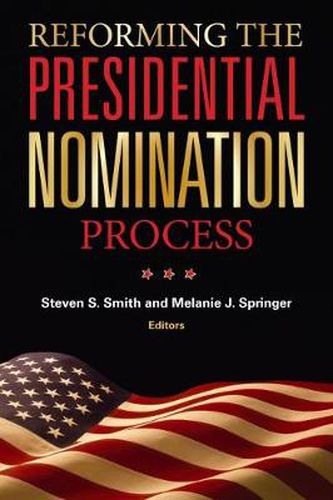Readings Newsletter
Become a Readings Member to make your shopping experience even easier.
Sign in or sign up for free!
You’re not far away from qualifying for FREE standard shipping within Australia
You’ve qualified for FREE standard shipping within Australia
The cart is loading…






The 2008 U.S. presidential campaign has provided a lifetime’s worth of surprises. Once again, however, the nomination process highlighted the importance of organization, political prowess, timing, and money. And once again, it raised many hackles. The Democratic contest in particular generated many complaints -for example, it started too early, it was too long, and Super Tuesday was overloaded. This timely book synthesizes new analysis by premier political scientists into a cohesive look at the presidential nomination process -the ways in which it is broken and how it might be fixed. The contributors to Reforming the Presidential Nomination Process address different facets of the selection process, starting with a brief history of how we got to this point. They analyze the importance -and perceived unfairness -of the earliest primaries and discuss what led to record turnouts in 2008. What roles do media coverage and public endorsements play? William Mayer explains the
superdelegate
phenomenon and the controversy surrounding it; James Gibson and Melanie Springer evaluate public perceptions of the current process as well as possible reforms. Larry Sabato (A More Perfect Constitution) calls for a new nomination system, installed via constitutional amendment, while Tom Mann of Brookings opines on calls for reform that arose in 2008 and Daniel Lowenstein examines the process by which reforms may be adopted -or blocked.
$9.00 standard shipping within Australia
FREE standard shipping within Australia for orders over $100.00
Express & International shipping calculated at checkout
The 2008 U.S. presidential campaign has provided a lifetime’s worth of surprises. Once again, however, the nomination process highlighted the importance of organization, political prowess, timing, and money. And once again, it raised many hackles. The Democratic contest in particular generated many complaints -for example, it started too early, it was too long, and Super Tuesday was overloaded. This timely book synthesizes new analysis by premier political scientists into a cohesive look at the presidential nomination process -the ways in which it is broken and how it might be fixed. The contributors to Reforming the Presidential Nomination Process address different facets of the selection process, starting with a brief history of how we got to this point. They analyze the importance -and perceived unfairness -of the earliest primaries and discuss what led to record turnouts in 2008. What roles do media coverage and public endorsements play? William Mayer explains the
superdelegate
phenomenon and the controversy surrounding it; James Gibson and Melanie Springer evaluate public perceptions of the current process as well as possible reforms. Larry Sabato (A More Perfect Constitution) calls for a new nomination system, installed via constitutional amendment, while Tom Mann of Brookings opines on calls for reform that arose in 2008 and Daniel Lowenstein examines the process by which reforms may be adopted -or blocked.